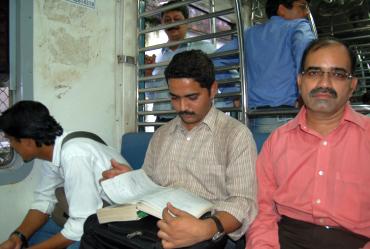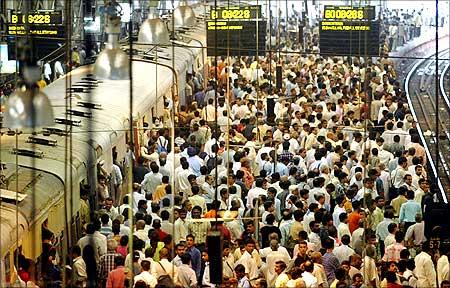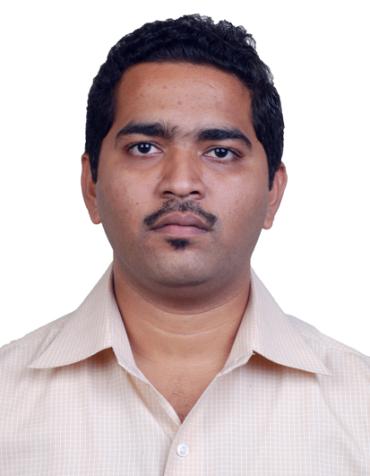
In the next part of this series we speak to a millworker's son who has struggled his way up and dreams of becoming a nuclear scientist one day.
There is no doubt that Mumbai's suburban trains are the city's lifeline. Carrying almost seven million people across its four main trunk routes -- Western, Central, Harbour and Trans Harbour -- they offer local residents -- if one can handle the peak hour rush -- the best mass transport commute.
Vaibhav Hatode is 27 and lives in Virar (the last station on the north side of the Western Railway's suburban train service). He travels 60 kilometres every day to Churchgate, the business hub located at the city's southernmost tip which juts out into the mighty Arabian Sea.
Many Mumbaikars, like Vaibhav, spend almost one-fourth of their active daytime commuting to work. Vaibhav spends almost three hours -- an energy sapping 90 minutes both ways -- of his 12-hour working day on the city's trains, making them an alternate study room.
An MSc in nuclear physics from Mumbai University's Department of Physics, he recently joined the prestigious Tata Institute of Fundamental Research as a scientific officer, conducting research in vacuum technology.
Going ahead Vaibhav wants to pursue a PhD in nuclear physics or high energy physics from either the US or UK for which he will appear for GRE and TOEFL this December as well as next June.
"I spend almost three hours commuting between Virar and Churchgate. When I board the train at 7 am (he wakes up at 5 am and works out a bit) there is not much rush in the train till I reach office by around 8.45. Also, while returning home I board a local from Churchgate, in which despite the crowd, I open my books and study for GRE and TOEFL," he says when asked how he balances studies and work.

"If not this December, I'll surely crack the GRE and TOEFL next June," he says. He is confident he will score enough high marks to earn a scholarship so that his air tickets and overseas accommodation are taken care of.
Vaibhav, along with his parents and younger sister, recently shifted to a one-bedroom apartment from a one-room kitchen flat in Virar. He now has a home loan of Rs 700,000 for 20 years.
His arduous journey to a comfortable sized accommodation began in Parel, central Mumbai, an area dominated by people who worked in the textile mills that provided employment to hundreds of thousands of Mumbaikars till the early 1980s after which most of the mills began shutting down due to labour unrest and a tacit understanding between the state's lawmakers and mill owners.
Eight people including Vaibhav's uncle shared the 240 square feet one-room flat in Parel.
Like several Mumbai mills following the great textile strike of 1982, the Shreeniwas Mills in Lower Parel (another central Mumbai area) shut down completely in 1984. Vaibhav's father, who worked as a mill hand at Shriniwas Mills, was unemployed a year after his son's birth.
Not one to be easily bogged down by the circumstances around him, his father, a skilled craftsman, learnt photography so that he could look after his family's financial well-being.
"I have learnt a lot of things from my father," says Vaibhav about how he studied up to Class 12 in an area notorious for socio-economic and other violent upheavals that followed the mills shutting down.
"We did see a lot of rowdies, gang wars and serious crimes in our neighbourhood, but my father helped us understand the meaninglessness and darkness associated with that kind of life," says Vaibhav who scored 80 per cent marks in physics, chemistry and mathematics in his Class 12 examination.
"Though concentrating on studies in such an environment was difficult I focused on my target because I wanted to change our fortunes," he adds.
It was this steadfastness that later helped him graduate in physics with 70 per cent marks, score a first class in MSc and get a post graduate diploma in business administration in operations management with 70 per cent marks.

While working at IIT-Mumbai Vaibhav did not have a home loan to cater to and so his salary of Rs 17,000 was enough for him to save Rs 2,000 every month, after accounting for household expenses and his life insurance investment premiums.
That equation has changed after he bought his new home.
Despite his housing loan Vaibhav saves about Rs 4,000 every month after paying an EMI of Rs 8,000, a personal loan EMI of Rs 4,600, insurance premium of Rs 3,000 and household and personal expenses of Rs 8,000.
"I want to save more by cutting down on my personal expenses," he says. "While my parents will take care of my sister's wedding, I too want to contribute my bit (towards that happy event)," says Vaibhav.
"Of course, I am saving for my higher studies too, but my sister's marriage is important as well," he adds.
While earning a doctorate is his near-term dream Vaibhav wants to return to India after finishing his studies and become a nuclear scientist.
"If I get a good job in India after completing my PhD, I will definitely come back," he says. "I don't want a huge salary but it should be enough for me to help support my parents to my satisfaction. If not, I may settle abroad."
"I know it's a rough road ahead," he adds -- when asked about how prepared he is to struggle more in his effort to save money for his future, his sister's wedding and be there to support his parents when they grow old -- "but I am ready."